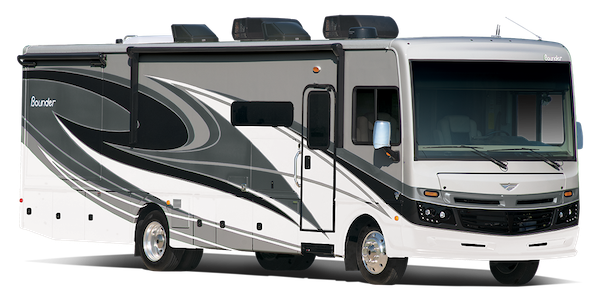
No matter who you talk to, every Class A owner will tell you there are things they learned the hard way. For some, the lessons were pretty painless. Unfortunately for others, they were left with a lasting impression and the promise to never be repeated. Therefore, let the wisdom of experience be bestowed upon new coach owners. The following are 20 Things NOT to do in a Class A Motorhome.
NOTE: Please keep in mind this is not a complete list but rather a guide of the most common tips echoed by many RV owners.
Top 20 Things Not To Do:
- Don’t travel at night. Most Class A owners will tell you that traveling during daylight is much easier to see debris in the road, and better gauge distances. Several cited the 10-3-3 rule which is traveling between 10 am to 3 pm and no more than about 300 miles.
- Don’t wait too late to be at your campsite or destination. Be sure to allow at least 2 hours of daylight remaining to set up. It’s much easier to park and hook up during daylight hours. Be mindful during the winter months of how early it gets dark.
- Don’t open your coach door to someone you don’t know or aren’t expecting. This seems like an easy one, but many people have been the victim of a crime by being too trusting. Opening the RV door to unexpected knocks can have unintended consequences.
- A drive-thru of any kind is not advisable. Park the coach and go inside. Drive-thru restaurants and stores are not equipped to handle motorhomes.
- Don’t change drivers while the coach is in motion. While you may have cruise control, you don’t have an auto-pilot. If you need to change drivers, stop someplace safe, and make the switch.
- No tailgating or evasive maneuvers. A motorhome has a very long stopping distance compared to cars. Tailgating can have dire results should the car in front stop quickly. Additionally, don’t swerve to miss something on the road as you could easily end up on your side. Keep an eye out for debris in the road and if you can’t avoid hitting something, get off the road as soon as possible to check for damage.
- Never leave the refrigerator partially empty as things will slide all over and make a mess while traveling. Fill up the fridge with food or if you have to, use empty containers or storage bins to make sure things are snug.
- Similar to the refrigerator, don’t travel with an empty freezer. Pre-bag ice from your ice maker or buy a bag of ice. This will help your overall gas mileage as the fridge/freezer will operate more efficiently.
- Don’t let your guard down while driving and always be alert on the road to other drivers around you. A common insurance scam is the bump and swoop where two cars work together. The lead car pulls in front of you then slams on the brakes. A second car will run into the back of you. All parties in the cars will immediately claim neck and back injuries to get a payoff from your insurance company. Motorcoaches are easy targets, especially Class A as they are expensive and usually well insured. Having a front-facing camera installed on the windshield with recorded memory will help you in case this ever happens. The camera will also give you an extra visual around the coach when you are away.
- Never leave a pet inside a coach without a redundant (alert) system. Simply put, shore power can fail. Make sure the generator is set up to kick on at a certain temperature. Tip: Set the generator to start one or two degrees before the alerted temperature level. This will give it time to warm up before the AC kicks on.
- Don’t leave home without some form of personal protection. Staying safe on the road is one thing, but being protected while camping is something people tend to overlook. Always make sure you have a plan should you encounter a situation or intruder. It’s always a good idea to have a security briefing with anyone traveling with you. Take a few minutes to show them where things are stored and what to do. Check out 6 Tips for Staying Safe in Your RV
- Never hit the road without a safety plan and supplies such as glow sticks, road markers, flashlights, safety cones, etc. Having these on hand will help ensure your safety in case of a roadside breakdown by alerting approaching drivers you have an emergency. It will also make it easier for others to spot you at night. Tip: Glow sticks can be found at most Dollar Stores. They are also fun in the evening for kids, so stock up!
- Don’t panic if the RV parks are full or you can’t find one. Simply find a local hotel or motel with good parking and book a room for the night. Even if you never step foot in the room, it will allow you to safely park your coach for the night. Some stores such as Wal-Mart, Cracker Barrel, and Bass Pro Shops will allow boondocking in their parking lot. Be sure to talk to the store manager or call ahead to let them know and ask where to park.
- Never leave anything plugged like a hairdryer, curling iron, or coffee maker while traveling. Everything should be unplugged and stowed away to prevent accidents.
- Never throw up in the motorhome toilet. If someone is sick, get them a garbage can or bag to be sick in. Motorhome toilets have chemicals in the septic tank. These can come up and sting the eyes or cause chemical burns to the face.
- Don’t flush feminine products or anything other than RV-safe toilet paper in motorhome toilets. Post a sign in the bathroom or let guests know that only waste and toilet paper in the toilet. Everything else has to be disposed of elsewhere.
- Never get on the road without a plan as to where you are going and the stops along the way. Having a plan can save a lot of heartaches and stress later on down the road. Also, leave a copy of your travel plans with friends or family. In case of emergency or if your end up out of cell coverage, they can more easily locate you.
- Don’t let any passengers, especially kids, traveling in the back of the coach walk around while the coach is moving. All passengers should be strapped in with seat belts and remain seated while the coach is in motion.
- Never drive side by side with another RV or semi-truck. When you see one coming up next to you, be sure to slow your speed down a bit. This will allow the other vehicle to pass easily so it won’t dwell next to your coach.
- Don’t forget to leave a note on the steering wheel or dash to lower the satellite dish and/or antennae on the roof. While this should be on your departure checklist it’s always a good idea to take this extra step. A post-it on the dash is an extra reminder that only takes a few seconds. Forgetting this step just once makes for a very expensive mistake.
Final Thoughts
No one ever wants to learn something the hard way. Reviewing and remembering this list will hopefully keep you safer on the road and prevent costly incidence. Planning, having a checklist, and taking the advice of seasoned owners will certainly pay off monetarily as well as give you peace of mind.



